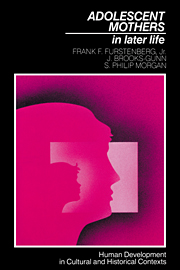Book contents
- Frontmatter
- Contents
- List of tables and figures
- Preface
- 1 Reassessing adolescent parenthood
- 2 Experience in adulthood
- 3 Pathways to success in adulthood
- 4 The children's experience
- 5 The intersecting life courses of adolescent mothers and their children
- 6 The life course of adolescent mothers: implications for public policy
- Appendixes
- Bibliography
- Index
Preface
Published online by Cambridge University Press: 04 August 2010
- Frontmatter
- Contents
- List of tables and figures
- Preface
- 1 Reassessing adolescent parenthood
- 2 Experience in adulthood
- 3 Pathways to success in adulthood
- 4 The children's experience
- 5 The intersecting life courses of adolescent mothers and their children
- 6 The life course of adolescent mothers: implications for public policy
- Appendixes
- Bibliography
- Index
Summary
A great many debts are incurred in a research project that spans 20 years. Some were gratefully acknowledged in the preface to Unplanned Parenthood: The Social Consequences of Teenage Childbearing (1976), which described the earlier phase of this study. Our gratitude to the many individuals who helped launch the Baltimore research has only increased over time because the quality of the data collected in the early years of the project provided the foundation for this volume.
We are able to date rather precisely when the idea of a 17-year follow-up occurred to us. In the summer of 1981, J. Brooks-Gunn and Frank Furstenberg first met at an Aspen Institute conference on “The First 20 Years of Life” sponsored by the Foundation for Child Development and organized by Orville (Bert) Brim and Jessie Emmett. We discovered a mutual interest in longitudinal research on families, a mutual concern about the intellectual chasm between studies of family socialization produced by sociologists and developmental psychologists, and a mutual commitment to improving the link between research on disadvantaged families and social policy aimed at improving the lot of the poor.
Over the years, Furstenberg had thought of revisiting the Baltimore mothers when their children reached puberty. He lacked the courage for such an undertaking. But a collaboration with Brooks-Gunn seemed just the thing. Fantasies of this sort rarely go any further than conversation over drinks.
- Type
- Chapter
- Information
- Adolescent Mothers in Later Life , pp. xi - xivPublisher: Cambridge University PressPrint publication year: 1987

